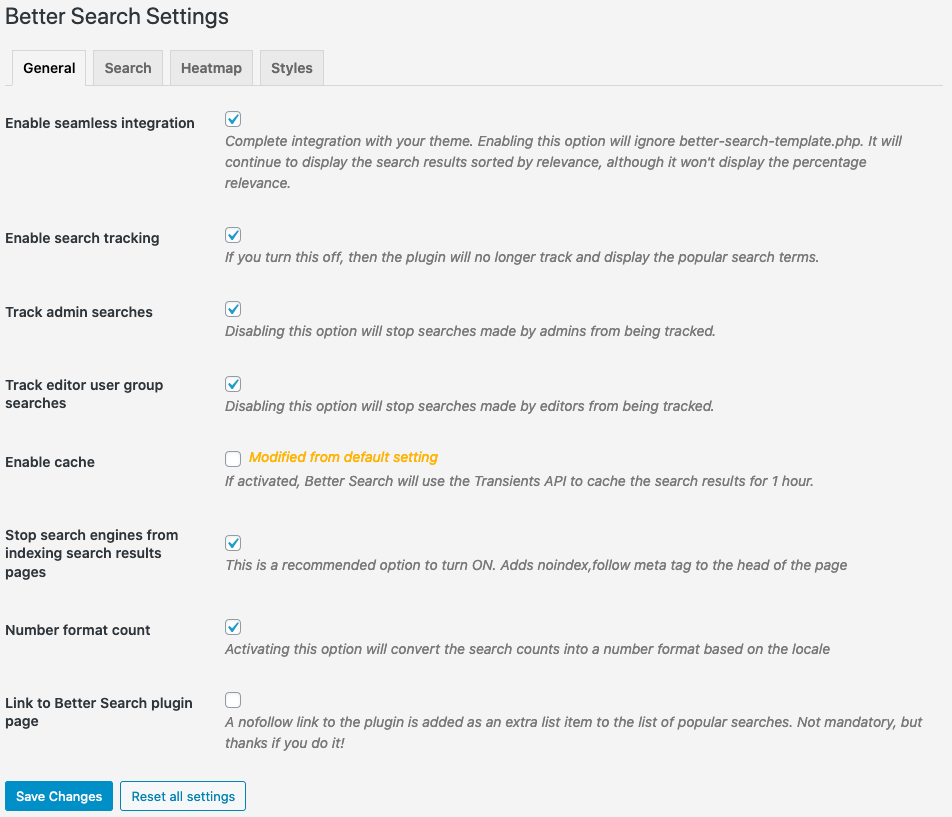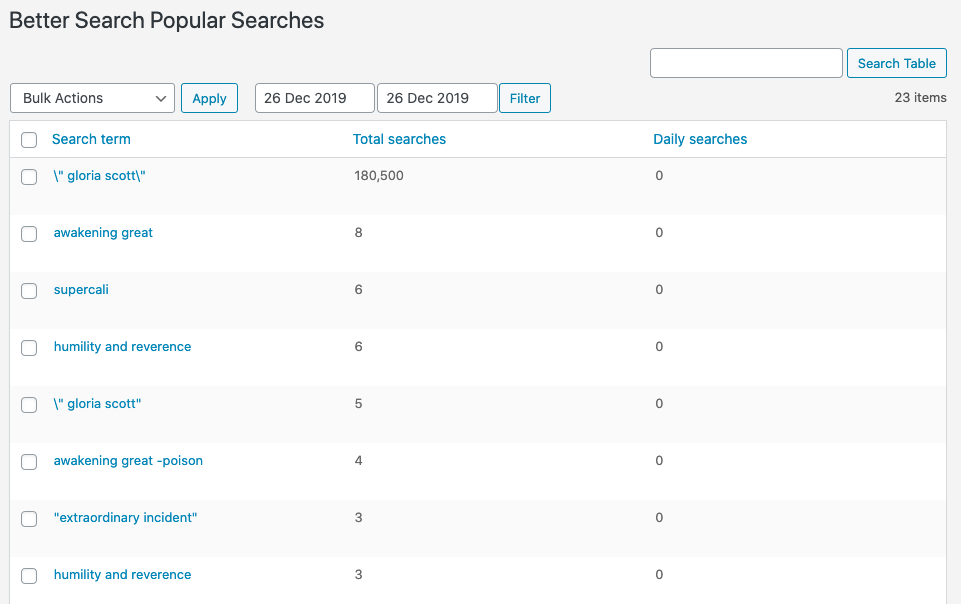Description
Are you looking for a way to improve your WordPress site search and make it easier for your visitors to find what they need? If so, you need Better Search, the plugin that replaces the default WordPress search engine with a more powerful and relevant one.
Better Search is not just a simple search plugin. It is a complete solution that gives you full control over your site search results. You can customize the output, fine tune the relevance, search within different fields and post types, track the popular searches, and much more.
With Better Search, you can make your site search more user-friendly and engaging. You can display a “search heatmap” of the most popular searches on your site, either as a widget or a shortcode. You can also use your own template file and CSS styles to match your theme perfectly.
Better Search has its own caching system and is also compatible with caching plugins like WP Super Cache and W3 Total Cache, so you don’t have to worry about performance issues. It also has a profanity filter that lets you block unwanted words from search queries. And it is translation ready, so you can use it in any language.
Here are some of the main features of Better Search:
- Automatic: Just activate the plugin and enjoy better search results right away
- Seamless integration: No need to edit any code or create custom search templates
- Relevance: Sort the results by relevance or date, and assign different weights to title and content
- Control the results: Search within title, content, excerpt, meta fields, authors, tags and other taxonomies and comments
- Popular searches: Show a heatmap of the most popular searches on your site, either as a widget or a shortcode
- AJAX Live Search: Show search results as you type in any search form on your site
- Customisation: Use your own template file and CSS styles for the ultimate look and feel
- Supports cache plugins: Works seamlessly with caching plugins like WP-Super-Cache and W3 Total Cache
- Profanity filter: Filter out any words that you don’t want to appear in search queries
- Translation ready: Use the plugin in any language
If you want to take your site search to the next level, download Better Search today and see the difference for yourself.
Features in Better Search Pro
Better Search Pro is the premium version of the plugin that offers even more features and functionality. With Better Search Pro, you can:
- Multisite search: Allow network admins to select specific sites for cross-network searches.
- Fuzzy search: Find results even if the search term is misspelt.
- Relevance threshold: Only show search results above a certain relevance threshold.
- Search the post slug: Include the post slug in the search results.
- REST API: Allow the REST API to utilize the Better Search when enabled.
mySQL FULLTEXT indices
On activation, the plugin creates three mySQL FULLTEXT indices (or indexes) in the *_posts table. These are for post_content, post_title and (post_title,post_content). If you’re running a multisite installation, then this is created for each of the blogs on activation. All these indices occupy space in your mySQL database but are essential for the plugin to run.
Contribute
Better Search is also available on Github
So, if you’ve got some cool feature that you’d like to implement into the plugin or a bug you’ve been able to fix, consider forking the project and sending me a pull request.
Plugins by WebberZone
Better Search is one of the many plugins developed by WebberZone. Check out our other plugins:
- Top 10 – Track daily and total visits on your blog posts and display the popular and trending posts
- WebberZone Snippetz – The ultimate snippet manager for WordPress to create and manage custom HTML, CSS or JS code snippets
- Knowledge Base – Create a knowledge base or FAQ section on your WordPress site
- Contextual Related Posts – Display related posts on your WordPress blog and feed
- Auto-Close – Automatically close comments, pingbacks and trackbacks and manage revisions on your WordPress site
Screenshots
Installation
WordPress install
-
Navigate to Plugins within your WordPress Admin Area
-
Click “Add new” and in the search box enter “Better Search”
-
Find the plugin in the list (usually the first result) and click “Install Now”
Manual install
-
Download the plugin
-
Extract the contents of better-search.zip to wp-content/plugins/ folder. You should get a folder called better-search.
-
Activate the Plugin in WP-Admin.
-
Goto Settings > Better Search to configure
FAQ
If your question isn’t listed there, please create a new post in the www.remarpro.com support forum. I monitor the forums regularly. If you’re looking for more advanced paid support, please see details here.
-
Can I customize the output?
-
Better Search has a huge set of options that help you customize the output or fine tune the results without leaving the comfort of your WordPress site. Goto Settings > Better Search to configure.
The plugin also supports the use of template files within your theme. You can create a file called
better-search-template.phpin your theme’s directory and the plugin will use it to display the results. -
My search words are getting filtered or *How does the profanity filter work*
-
Better Search includes a very cool profanity filter using the script from Banbuilder. You can customize which list of words you want to filter out from the Better Search settings page. Find the setting called “Filter these words:”. The plugin will automatically strip out both partial and complete references of these words.
You can turn the filter off by emptying the list.Know of a better profanity filter? Suggest one in the forums.
-
How can I report security bugs?
-
You can report security bugs through the Patchstack Vulnerability Disclosure Program. The Patchstack team help validate, triage and handle any security vulnerabilities. Report a security vulnerability.
Reviews
Contributors & Developers
“Better Search – Relevant search results for WordPress” is open source software. The following people have contributed to this plugin.
Contributors“Better Search – Relevant search results for WordPress” has been translated into 2 locales. Thank you to the translators for their contributions.
Translate “Better Search – Relevant search results for WordPress” into your language.
Interested in development?
Browse the code, check out the SVN repository, or subscribe to the development log by RSS.
Changelog
4.0.0
Release post: https://webberzone.com/announcements/better-search-v4-enhance-wordpress-search-with-pro-features/
-
Features:
- New live search feature that shows search results as you type.
- [Pro] New setting to enable and set the fuzzy search level. Once enabled, the plugin will attempt to find results if the search term is misspelt. This only works effectively for English words.
- [Pro] Multisite search feature allowing network admins to select specific sites for cross-network searches. Sites not selected will function independently.
- [Pro] New setting to only show search results above a certain relevance threshold.
- [Pro] New setting to search the post slug.
- [Pro] New setting Enable REST API allows the REST API to utilize the Better Search when enabled. Read this knowledge base article for more information about how Better Search enhances the Search endpoint.
-
Enhancements/Modifications:
- Renamed
Better_SearchtoBetter_Search_Core_Query. Each of the methods now removes the filter from itself. It will also automatically parse wp_query parameters. - Updated
Better_Search_Core_Queryfilters to use the class instead ofWP_Query. - Display admin notice if any FULLTEXT index is missing and Enable mySQL FULLTEXT searching is enabled. This is only shown to admins and cannot be dismissed until the indexes are created.
- Better Search results page now works with Block Templates. You can enable Seamless mode to use your theme’s search template.
- [Pro] Added a new button to create the indexes and display the index status on the settings page under the Search tab for Enable mySQL FULLTEXT searching.
- Renamed
-
Bug fixes:
- Quotes in search terms should work correctly now.
For previous changelog entries, please refer to the separate changelog.txt file or Github Releases page







